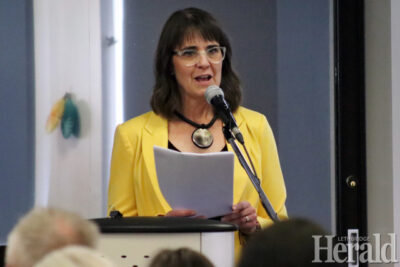SACPA hears about one man’s journey to a death by choice
By Al Beeber - Lethbridge Herald on April 21, 2023.
 Herald photo by Al Beeber
Tania Stilson talks to the Southern Alberta Council on Public Affairs Thursday about the journey her father John Warren took to a medically assisted death.
Herald photo by Al Beeber
Tania Stilson talks to the Southern Alberta Council on Public Affairs Thursday about the journey her father John Warren took to a medically assisted death.LETHBRIDGE HERALDabeeber@lethbridgeherald.com
Before he ended his life on Jan. 4 with a medically assisted death, John Warren reached out to The Herald about a letter he’d written outlining the choices available to Lethbridge residents regarding the disposal of their earthly remains, specifically the option of green burials.
He had applied for Medical Assistance in Dying and was approved. On Jan. 2, Warren submitted his letter to the paper and a day later asked that it not be published until Jan. 7.
Warren’s journey to a death of his own choosing was discussed Thursday at the Southern Alberta Council on Public Affairs by his youngest daughter Tania Stilson.
Warren spent four years from 2012-16 as the vice president of the national board of Dying for Dignity Canada and fought for regulations to be changed that would make an assisted death legal in this country.
He threw himself into the subject of dying with dignity and was “part of the team that fought hard to change the law in Canada,” said Stilson.
In 2015, the Supreme Court declared the Criminal Code would need to change to satisfy the Canadian Charter of Rights.
“Dad resigned that fall with the satisfaction that things were moving forward. He said it was one of the most gratifying things he’d ever done,” Stilson said.
In an emotional, heartfelt talk to a packed dining room at the Lethbridge Senior Citizens Organizations, Stilson discussed her father’s determination to end life on his terms as well as the restrictions faced by people wanting to make that choice.
Warren was a husband and the father of three daughters who lived life to its fullest while he was able, Stilson recalled.
Warren, who played squash into his 70s, first began having pain issues in 2010 with Hepatitis B which eventually led to peripheral neuropathy.
On July 15, 2010 he described to his family that without warning on the 16th hole he felt weak and his hands hurt when he finished the round. He had a beer and ate supper but by the time he left his hands and feet were swollen and Barbara had to drive him home.
His liver started shutting down and he lost his mobility.
At this point, Warren began thinking about people’s ability, or lack thereof, to choose how and when their death happens, Stilson said.
“He vowed that he would never not have control over his own death again. He believed in choice,” said Stilson.
Stilson said the Warren family was “very unified in their support” for his choice to die on his terms, as difficult as it was.
Since Parliament passed its legislation in 2016, 31,664 Canadians have chosen a medically assisted death, Stilson told her audience.
In 2021, 52.3 per cent of those were men and 47.7 per cent women. In that year there were 10,064 medically assisted deaths, an increase of 32.4 per cent over 2020, according to StatsCan.
MAID, according to StatCan, accounted for 3.3 per cent of all deaths in Canada in 2021, which is up from 2.4 per cent in 2020.
When Bill C-7, the MAID bill, was unveiled in 2021, criteria included:
• Have a serious and incurable illness, disease or disability;
• Be in an advanced state of irreversible decline in capability;
* Have enduring and intolerable physical or psychological suffering;
* Alleviated under conditions the person considers acceptable.
There are two “tracks” for MAID acceptance.
Under Track One, death is reasonably foreseeable. Two practitioners must confirm eligibility and the 10-day reflection period is eliminated. Advance consent can be used under certain circumstances.
Under Track Two, death is not reasonably foreseeable. There is also a minimum 90-day assessment period and two mandatory assessments.
Stilson’s talk described her father’s visit to a doctor in Puerto Vallarta where he and Barbara spent time and because of excruciating pain made the decision to reluctantly leave Mexico late last October and return to Canada.
Several assessments were done on Warren when he returned, with the family hoping for a Track One determination which was initially approved on Nov. 7 in a phone call from the first assessor.
“We were confident, likely over-confident,” Stilson recalled.
A second assessor on Nov. 10 shocked the family by saying he meets eligibility but wait for 90 days from the first reading of the application on Oct. 5.
“We are devastated, and quite frankly frustrated and shocked,” Stilson said.
The family requested a third one and that assessor approved Warren for Track Two.
Warren understood but didn’t necessarily agree.
“We breathe a sigh of relief and know that this part of the process is over. He will have a good death,” she said.
Stilson said the family “found peace and joy” with the days they had left to spend together. Her parents would have celebrated their 60th wedding anniversary in March, she said.
She said during the Christmas season the family had a “weird sense of being in grief” but having the person who was going to die still with them.
Before Jan. 4, Stilson said she asked every question she could about MAID. The family did a mental walk-through of the procedure and schedule with Warren’s final moments coming in a bedroom at he and Barbara’s condominium with their daughters present. Spouses waited outside the condo as Warren fulfilled his desire to die on his terms.
Stilson said it’s important to focus on the love, not the loss and to leave nothing unsaid and have no regrets.
“He had complete peace with his decision” and no fears, she said, adding the process was peaceful, compassionate and heartbreaking.
The family “is so proud of the work he did for Canadians and proud he could walk down this path for himself.” Her dad’s choice, said Stilson, was one of knowingness, bravery, compassion and empowerment.
But work is still to be done. Stilson told the crowd, saying a good death and a well-planned death matter.
She said it’s important for families to have a dialogue about death and dying.
“Be supportive,” Stilson urged, telling the audience to a standing ovation that support is a great act of love, maybe the greatest act a family can give a loved one.
Warren was called a friend of SACPA who made presentations to the organization several times on the subject of dying with dignity. He inspired several in the community to gather together in 2013 and work toward legalizing medically assisted dying in the country, the audience was told.
“Dad was instrumental in helping Canadians to be able to have the choice of a dignified, compassionate and empowering death through medical assistance in dying,” Stilson said.
“And when the time came, he was able to make the choice for himself,” she added.
Follow @albeebHerald on Twitter
49-48





Well stated Tania!
A life well lived and dying on his own terms.
Alongside your sorrow, what wonderful memories you and your family must have.